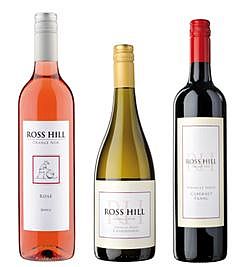By Nicki Bourlioufas
Ross Hill has undertaken extensive measures to reduce greenhouse gas (GHG) emissions caused by the wine business and to minimise its impact on the environment. With full certification, wine consumers can trust its wines to be carbon neutral, says Ross Hill Wines co-owner, James Robson.
Ross Hill Wines is Australia’s first winery to be registered with the Australian Federal Government as an NCOS certified carbon neutral and has produced carbon-neutral wines since 2016. What does this mean? Carbon neutrality is achieved when a company or product’s net greenhouse gas emissions are equal to zero.
There is a rapidly growing interest, and an increasing sense of urgency in carbon neutrality under the Australian government-recognised certification, the National Carbon Offset Standard (NCOS). As of February 2020 there are 138 certifications across 91 entities. This is a 70% increase in 12 months.
To achieve carbon neutrality certification under the NCOS Carbon Neutral Program, an entity must measure its carbon footprint, reduce emissions where possible and purchase NCOS eligible abatement to offset the remaining emissions.


Ross Hill Wines has had not only the wine business itself certified but its wines certified carbon neutral as well.
If you can visit the winery, established in an old apple packing shed on Mount Canobolas near Orange in New South Wales, it’s a delightful experience in a pretty location. The tasting room has been elegantly renovated into an elegant and large airy space looking out onto a landscaped courtyard. You can try most of the Ross Hill wines for $10, and the service staff were friendly and helpful, with a free tour of the winery offered daily at 10am.
Ross Hill also offers food sampling platters, including vegan options, rather than the cheese and cured meats that typically grace (or disgrace) winery platters. That’s a helpful addition, since eating dairy and beef farming is hugely damaging to the environment and given cattle’s emissions of the most damaging of greenhouse gases, methane.


Back to the wine, one of my favourites was the Family Series Jessica Rosé (RRP $20) was well priced, made from Cabernet Franc (rare in Australia), it was aromatic and crisp on the palate and cleaned it well to make way the 2019 Pinnacle Series Cabernet Franc ($50), which boasted ripe berry and cherry fruit, a rich colour and elegance, with many years to come to reach its peak. If you like Cabernet Franc, it’s a welcome change on the traditional French varietals Shiraz and Cabernet Sauvignon, and it likes the cool climate in Orange, a bit like the Loire Valley in France where it thrives. The 2019 Pinnacle Series Chardonnay ($40) was also a favourite, elegant with good buttery mouthfeel and length.
“Our environmental policy sees no use of chemical insecticides and a reduction of irrigation. Sheep graze between the vines after harvest, naturally eliminating weeds and increase soil nitrogen levels with their hooves. The techniques used are diverse and allow us to achieve our NCOS rating and to funnel the funds saved through the reduced energy costs back into the business.” – Peter Robson, co-owner Ross Hill Wines. q
Energy and carbon management specialists, Pangolin Associates, guided the Ross Hill Wine Group through the National Carbon Offset Standard (NCOS) process.
Ross Hill Wines are available in restaurants and serve as the house wines for such iconic Sydney restaurants as Catalina (Rose Bay, NSW) and the Fratelli Fresh group of restaurants. You won’t find Ross Hill Wines in any of your big supermarket bottle shops but you may find the range in your favourite local pub or independently owned bottle shop.
